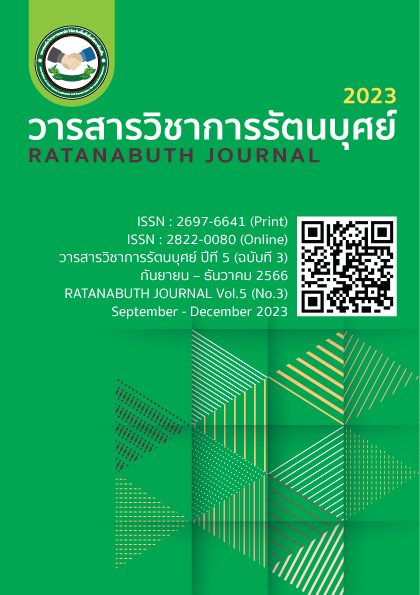Factors Affecting Innovative Behavior in Work of a Commercial Bank in the Center Region of Thailand Factors Affecting Innovative Behavior in Work of a Commercial Bank in the Center Region of Thailand
Main Article Content
Abstract
The purpose of this study was to study the influence of work engagement and transformational leadership that influences the Innovation Work Behavior and study the influence of Innovation Work Behavior Transformational Leadership and work engagement towards behavior that creates innovation in work The sample group includes Employees of a commercial bank in the central region of Thailand, 15 provinces, sample size of 400 people, which used questionnaires as a tool for the study. and used data analysis using a structural equation model. The results of the study found that the level of work engagement transformational leadership Organization Citizenship Behavior that creates innovation in work behavior at a high level The results of the hypothesis testing found that the work engagement variable transformational leadership and Organization Citizenship Behavior. It has a positive influence on innovative behavior in the work of employees of a commercial bank in the central region of Thailand.
Article Details

This work is licensed under a Creative Commons Attribution-NonCommercial-NoDerivatives 4.0 International License.
References
ฉัตรฤทัย อินทุโศภน และ พิพัฒน์ นนทนาธรณ์.(2559).อิทธิพลของภาวะผู้นำทางยุทธศาสตร์และพฤติกรรม การเป็นสมาชิกที่ดีขององค์การที่ส่งผลต่อความจงรักภักดีต่อองค์การของนายทหารชั้นประทวน สังกัดหน่วยบัญชาการป้องกันภัยทางอากาศกองทัพบกในเขตกรุงเทพมหานคร.วิทยานิพนธ์บริหารธุรกิจมหา.บัณฑิตสาขาวิชาบริหารธุรกิจ, กรุงเทพฯ: มหาวิทยาลัยเกษตรศาสตร์
ณิชา คงสืบ.(2558).แรงจูงใจในการทำงานวัฒนธรรมองค์กรและพฤติกรรมการเป็นสมาชิกที่ดีขององค์กรที่มีผลต่อการทำงานเป็นทีมกรณีศึกษา:บริษัทลิสซิ่งแห่งหนึ่งเขตกรุงเทพมหานคร.ปริญญาบริหารธุรกิจมหาบัณฑิต, กรุงเทพฯ: มหาวิทยาลัยกรุงเทพ.
ธนกฤต แซ่โค้ว.(2558).ปัจจัยด้านองค์กรที่ส่งผลต่อพฤติกรรมเชิงนวัตกรรมในการปฏิบัติงานเพื่อ รองรับเศรษฐกิจอาเซียน ของกลุ่มอุตสาหกรรมแปรรูป เนื้อสัตว์ ในเขตกรุงเทพมหานครและปริมณฑล.ปริญญาบริหารธุรกิจมหาบัณฑิต, กรุงเทพฯ: มหาวิทยาลัยกรุงเทพ.
ธมยันตี ประยูรพันธ์.(2561).การทดสอบโมเดลสมการโครงสร้างความพึงพอใจในการปฏิบัติงานพฤติกรรม การเป็นสมาชิกที่ดีขององค์กรและพฤติกรรมการทำงานเชิงนวัตกรรมของพนักงานองค์กรวิสาหกิจ ขนาดกลางและขนาดย่อมในจังหวัดชายแดนใต้.คณะวิทยาการจัดการ, สงขลา: มหาวิทยาลัยนราธิวาสราชนครินทร์.
ธรรมรัตน์ จังศิริวัฒนา.(2564). อิทธิพลของการสื่อสารที่โปร่งใสภายในองค์การต่อความผูกพันในงานของ พนักงานที่ปฏิบัติงานในระหว่างการจัดการภาวะวิกฤติ:บทบาทปัจจัยแทรกของความสัมพันธ์ ระหว่างพนักงานกับองค์การ. วารสารวิชาการบริหารธุรกิจ,10(2), 132-147.
บุญส่ง สุประดิษฐ, บุญเรียง ขจรศิลป์และธนีนาฏ ณ สุนทร.(2562). การพัฒนารูปแบบความสัมพันธ์เชิงสาเหตุของปัจจัยที่มีอิทธิพลต่อผลการปฏิบัติงานของอาจารย์พยาบาลสังกัด สถาบันการศึกษาของรัฐ.วารสารวิทยาลัยพยาบาลบรมราชชนนี,35(1), 199-213.
ประฏิพัฒน์ แย้มชุติเกิดมณี, และ วิชิต อู่อ้น.(2564). กรอบแนวคิดอิทธิพลของการจัดการองค์ความรู้ต่อการ สร้างนวัตกรรมในองค์กรและความพึงพอใจในงานของบุคลากรสถาบันอุดมศึกษาเอกชนใน กรุงเทพมหานคร.วารสารมนุษยศาสตร์และสังคมศาสตร์,15(3),153-164.
ปุณณวิช แก้วล้อม.(2560). อิทธิพลของภาวะผู้นำการเปลี่ยนแปลงการรับรู้การสนับสนุนจากองค์การที่มีผล ต่อความผูกพันและการคงอยู่ของพนักงานบริษัทผลิตบรรจุภัณฑ์โลหะในจังหวัด สมุทรปราการ.การค้นคว้าอิสระปริญญามหาบัณฑิต,กรุงเทพฯ: มหาวิทยาลัยกรุงเทพ.
วรัญญา ศิลาหม่อม, ขวัญฤดี พรชัยทิวัตถ์.(2564).พฤติกรรมเชิงนวัตกรรมของพนักงาน ธนาคารพาณิชย์ ใน จังหวัด ขอนแก่น.หลักสูตรบริหารธุรกิจมหาบัณฑิต วิทยาลัยบัณฑิตศึกษาการจัดการ, ขอนแก่น: มหาวิทยาลัยขอนแก่น.
สาธิต สุวรรณโสภาและวงศ์ธีรา สุวรรณิน.(2564).ภาวะผู้นำการเปลี่ยนแปลงและสภาพแวดล้อมในการ ทำงาน ที่ส่งผลต่อพฤติกรรมการสร้างสรรค์นวัตกรรมของพนักงานบริษัทลิสซิ่งในเขตกรุงเทพมหานคร. หลักสูตรบริหารธุรกิจมหาบัณฑิต, กรุงเทพฯ: มหาวิทยาลัยรามคำแหง
Afsar, B., Masood, M., & Umrani, W. A. (2019). The role of job crafting and knowledge sharing on the effect of transformational leadership on innovative work behavior. Personnel Review, 48(5), 1186-1208.
Ariani, D. W. (2013). The relationship between employee engagement, organizational citizenship behavior, and counterproductive work behavior. International Journal of Business Administration, 4(2), 46.
Asbari, M., Hidayat, D. D., & Purwanto, A. (2021). Managing employee performance: From leadership to readiness for change. International Journal of Social and Management Studies, 2(1), 74-85.
Byrne, B. M., & Van de Vijver, F. J. (2010). Testing for measurement and structural equivalence in large-scale cross-cultural studies: Addressing the issue of nonequivalence. International journal of testing, 10(2), 107-132.
Chompukum, P. (2008). The Effect of Internal Career Orientations on Organizational Commitment. Chulalongkorn Business Review, 30(1-2), 23-40.
Chumkesornkulkit, P., & Wichian, S. N. (2018). Innovative work Behavior: Concept, Antecedents and Challenges. Journal of Behavioral Science for Development, 10(1).
Cronbach, L. J. (1951). Coefficient alpha and the internal structure of tests. psychometrika, 16(3), 297-334.
Dima, A. M., Begu, L., Vasilescu, M. D., & Maassen, M. A. (2018). The relationship between the knowledge economy and global competitiveness in the European Union. Sustainability, 10(6), 1706.
Gerasymchuk, V. H., & Sakalosh, T. V. (2007). Competitiveness and knowledge-based economy: information and communication technology impact evaluation. Business: theory and practice, 8(4), 195-203.
Hair Jr, J. F., Babin, B. J., & Anderson, R. E. (2010). Multivariate Data Analysis: A Global Perspective (7th ed.). New Jersey: Pearson Prentice Hall.
Khan, M. A., Ismail, F. B., Hussain, A., & Alghazali, B. (2020). The interplay of leadership styles, innovative work behavior, organizational culture, and organizational citizenship behavior. Sage Open, 10(1), 1-16.
Li, H., Sajjad, N., Wang, Q., Muhammad Ali, A., Khaqan, Z., & Amina, S. (2019). Influence of transformational leadership on employees’ innovative work behavior in sustainable organizations: Test of mediation and moderation processes. Sustainability, 11(6), 1594.
Odoardi, C., Battistelli, A., Montani, F., & Peiró, J. M. (2019). Affective commitment, participative leadership, and employee innovation: A multilevel investigation. Revista de Psicología del Trabajo y de las Organizaciones, 35(2), 103-113.
Purwanto, A., Purba, J. T., Bernarto, I., & Sijabat, R. (2021). Effect of Management Innovation, Transformational Leadership, and Knowledge Sharing on Market Performance of Indonesian Consumer Goods Company. Journal of Applied Management (JAM),19(2),424-434.
Purwanto, A., Purba, J. T., Bernarto, I., & Sijabat, R. (2021). Effect of transformational leadership, job satisfaction, and organizational commitments on organizational citizenship behavior. Inovbiz: Jurnal Inovasi Bisnis, 9, 61-69.
Thongsri, N., & Chang, A. K. H. (2019). Interactions among factors influencing product innovation and innovation behaviour: Market orientation, managerial ties, and government support. Sustainability, 11(10), 2793.
Yamane, Taro. (1970). Statistics an Introductory Analysis 2nd ed. Tokyo: John Weather Hill.


